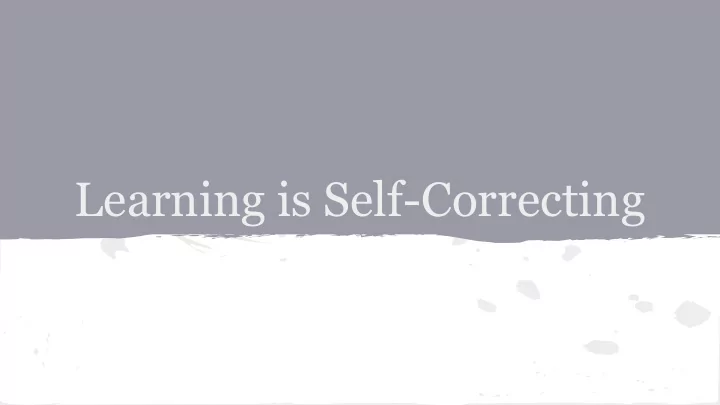

Learning is Self-Correcting
Definition A program founded on a growth mindset where every child sets ambitious horizons for success; that teaches neuroplasticity and the science of the brain and knows that failures today do not dictate or preclude future achievements. An education for change that develops persistence and resilience where intellectual risk-taking, trial and error, mistakes and failure are signs of progress, and that what matters is how we move forward and the ends we pursue.
Interpretation An approach to teaching kids that encourages mindfulness when learning. Students need to be aware of how learning occurs and how they individually learn.
Areas of Interest Growth mindset versus fixed mindset Neuroplasticity-how learning affects the brain Resilience
Fixed Mindset “A fixed mindset comes from the belief that your qualities are carved in stone – who you are is who you are, period. Characteristics such as intelligence, personality, and creativity are fixed traits, rather than something that can be developed.”
Growth Mindset “A growth mindset comes from the belief that your basic qualities are things you can cultivate through effort. Yes, people differ greatly – in aptitude, talents, interests, or temperaments – but everyone can change and grow through application and experience,” (Source: The Power of Belief – Mindset and Success , Eduardo Briceno)
The Effect of Praise Carol Dweck: The Effect of Praise
How to Learn? From mistakes Learning from mistakes is a natural and productive process. Standardized testing produces the opposite. In the past, people went to school to get the information from the teacher. Today, information is everyone, so children need to learn how to access and use that information. Teachers can facilitate that process through: ● Experiential Learning ● Learning from failure (trial and error) ( Source: How to Learn? From Mistakes, by Dana Laufenberg)
Neuroplasticity: How does learning affect the brain? Intelligence is not fixed. It is constantly developing during our lives. Translation: All those little brains in your classroom are physically growing and changing every time they learn something. (Source: How lessons and experiences can shape and grow your students' brains over time. By Sara Bernard)
How to enable learning? Practice, practice, practice (creates stronger connections to the brain) Put information in context (when students see relationships between old and new material greater brain cell activity occurs and aids long-term memory and retrieval) Let students know that this is how the brain works ( intelligence is not predetermined-it requires practice: the realization that they can literally change their brains through study and review is empowering)
Resilience / Grit Letting Kids ‘Fail’ “You can create a classroom culture in which struggle and risk-taking is valued more than just getting the right answer." Changing Mindsets to Encourage Kids to Persevere ● Growth Mindset versus Fixed Mindset ● Labels like “smart”, “gifted”, “challenged” restrict students’ views of themselves and their abilities. ● Encourage kids to learn through a series of trial and error steps. If plan A, doesn’t work, try plan B until they like the outcome. (Source: Does Teaching Kids to get ‘Gritty’ help them get ahead? nprED)
Resilience/ Grit Critics ● Resembles the Protestant work ethic-put your head down and push forward. ● Kids will keep trying one approach even if it is unproductive, and then lose interest. ● Learning needs to be fun and productive. ( Source: The Down Side of “Grit”. by Alfie Kohn)
In Practice: Lower School Kids Mindfulness exercises First grade daily mindfulness practice
1st Grade Class Students make paper airplanes with modifications: ● Learning by Design ● Trial and Error
In Practice: Upper School Kids Reading groups: The Merchant of Venice by William Shakespeare ● Multi-level groups (9-12 Humanities) ● Reading aloud and discussion (general and specific focus questions) ● Messy process: together meaning is created and shifts during group discussion
Recommend
More recommend